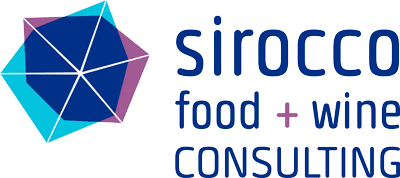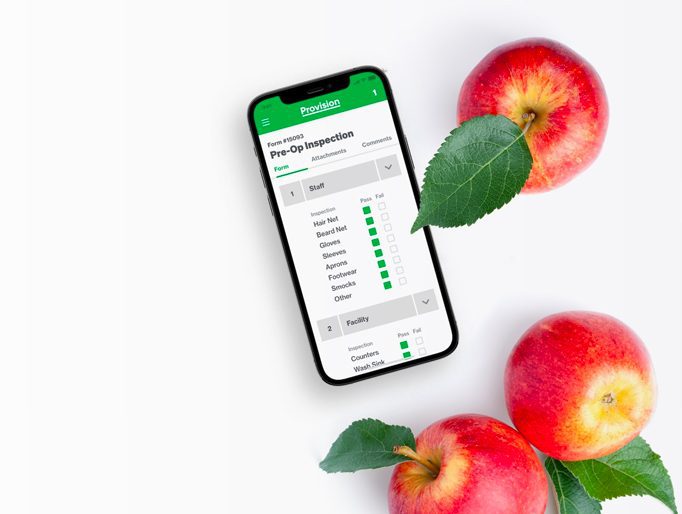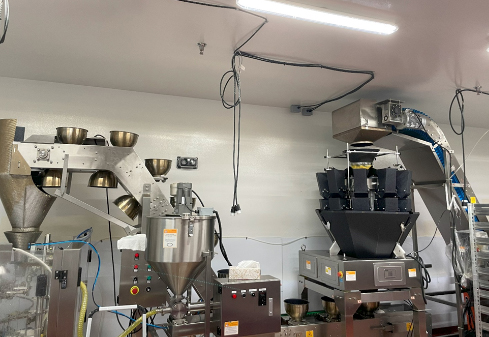If you keep informed on tech news, you know that digitized food safety systems have been very popular in the past few years. We have blogged on this topic before. Small businesses with paper based HACCP and SQF systems can easily commit to digital SQF implementations. To be successful, start with the right tools.
Introducing Greek House Restaurant Inc. in Kelowna, British Columbia, Canada.
Greek House Restaurant Inc is a family-owned business. With fewer than 10 employees, the facility manufactures Greek food (Ready-To-Eat chilled potatoes and rice dishes) and Greek spreads such as hummus and tzatziki, which are sold in Western Canada through Sobeys and other retailers. The production schedule runs five (5) days a week.
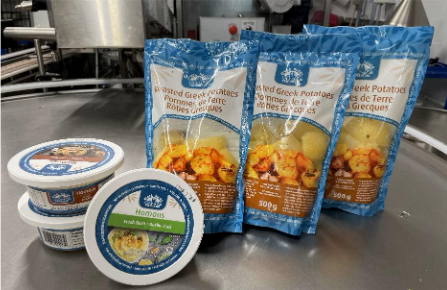
Maria and her father Christos Vassilopoulos have been HACCP-certified through SAI Global for 8 years. The business has experienced noticeable growth during the COVID-19 pandemic, and the owners proceeded to automate the production lines. Maria is tech savvy and knowledgeable with SQF digital implementations.
They have been working with Karine Lawrence at Sirocco Consulting since certifying to HACCP. They are now seeking SQF certification and aim to complete the project by Spring 2024. They opted to migrate to an electronic food safety program and have been able to work with the Provision Analytics app for over a year. They acquired a copy of Sirocco’s SQF Bundle 9 and are now implementing SQF through Provision.
Recently, Maria rated Provision and gave the app a 10 out of 10. Strong from one year of use, she is satisfied with the tool. She received excellent and prompt customer service. Pricing was also very competitive. She feels confident to upgrade to SQF from HACCP using Provision Analytics.
“What attracted me to Provision was that the app was easy to understand, quick to implement, and the Provision team provided excellent customer service. Pricing was also more reasonable than a few other options I investigated.”
Maria Vassilopoulos, Co-owner
Greek House Restaurant Ltd.
The team at Provision started the set-up process by collecting and inputting business information pertaining to Greek House’s Vendors, Employees, Equipment, and Products under the Resources Module. This information now shows as a drop-down menu under each resource. When using the task creation function of Provision, Maria can easily assign SQF forms to be completed by members of her team based on an established schedule. She can also document and trace her daily production by selecting finished product SKUs and other ingredient item numbers in the system. Another benefit of digital SQF implementations is the ability to conduct trace exercises. Mock recalls and masse balance calculations are quick and easy with the digitized system. This is imperative for compliance with food safety regulations.
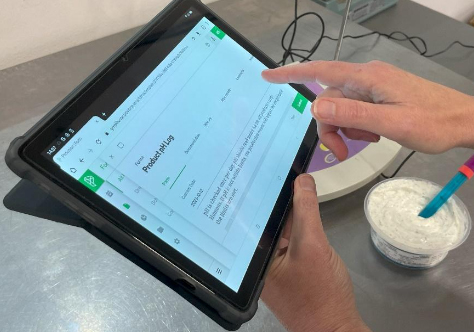
Regarding SQF training, Maria and her production lead, Mark, took the Advanced (Accredited) HACCP Training through Zosi Learning. They obtained their HACCP certificate to work as SQF lead and backup practitioners.
The 3 HACCP plans which they maintain have now migrated to Provision. The plans are approved and uploaded in PDF format. They may be consulted by a remote inspector or auditor who has been granted secure access to perform a document review. This digital SQF implementation feature saves time and money during SQF certification process because the onsite audit is entirely focused on floor inspections, record reviews, and conducting staff interviews.
The Greek House team designed the CCP logs in Provision and uses a tablet and cell phone for data entry on the floor. They monitor the pH and level of preservatives of acidified spreads. Other CCPs include allergen labelling and the controlled cooking and cooling of seasoned potato and rice dishes. The CCP logs in Provision are completed and verified by applying handwritten signatures. The use of rules established for critical limits forces the team to take corrective actions if specifications are not met. Maria and her team can easily trend compliance against HACCP critical limits by reviewing the CCP reports generated through the forms. This allows them to efficiently perform their HACCP validation studies and food safety plan verifications to guarantee the safety and legality of their food products.
The next step was for Maria to edit the SQF Bundle 9 and customize the procedures and management commitment policy to fit her business practices. She edited 43 documents and uploaded them to Provision Analytics software. These procedures are now branded with the company logo. They identify the people responsible for food safety activities at Greek House Restaurant Inc. The frequency of tasks is aligned with the SQF code for Food Manufacturing (Scope of Certification: Food Sector Categories 18 and 20, SFCR Food Registration for inter-provincial trade) or matches their internal processes. As per SQF code requirements, each document has a revision history for proper document control.
Digital SQF implementations start with the review and editing of System Elements and Module 11 procedures. The team is making good progress and still needs to complete their module 2 and 11 risk assessments using the digitized Bundle forms. Employee training and task monitoring/verification will be documented digitally in the Provision Analytics app. Sirocco forms may be quickly customized, where required, to fit the business operations.

- Figure 1 – Seasoned potato and cooked rice processing lines. Greek House Restaurant Ltd.
When this phase of the SQF digital implementation is finished, Maria and her team will schedule verification tasks in Provision to hold and document their monthly SQF meetings, annual management, and food safety plan reviews using the electronic meeting minutes in the app. The system verifications, site inspections, and internal audits will be completed with the help of Sirocco Consulting. The completed SQFI audit checklist (Excel document) and GFSI Amendments will be uploaded in Provision for review by the SQF auditor during the initial SQF certification audit.
The strength of digital SQF implementations lies in the scheduling of monitoring and verification activities. Certification audits are more likely to succeed if all tasks are completed on time and recorded for compliance. Tools such as the activity dashboard enable the practitioners to be in control and more responsive. In addition, the use of rules in digitized forms, logs, and questionnaires – product is out of specifications, HACCP critical limits are not met – triggers corrective actions automatically in the app. This feature reinforces food safety awareness and encourages food handlers to question their food safety measurements. Combined with food safety training, an electronic system for food safety compliance elevates the food safety culture within a food manufacturing site.
To fast track your digital SQF implementations, refer to the SQF resources, gap assessment and certification resources on our website.
Sirocco Food + Wine Consulting’s certified SQF Consultants and Lead HACCP/PCQI instructors have been helping food businesses since 2013. We provide food safety plan creation services (HACCP, PC plans for Human Food, Canadian PCP plans) and HACCP/SQF/PCQI training services. If you require assistance with your HACCP plan or SQF program, contact us to request a quote. Subscribe to our newsletter for news on food safety regulations and industry standards.
